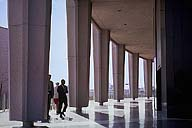
|
Image-GoddenF40
Dorothy Chandler Pavilion, Los Angeles Cultural Center. The outside of this building consists of a continuous reinforced concrete frame, the bottom of which can be seen in this slide, and consists of tapered columns pinned at the base. As the top of the column is built into a stiff horizontal beam, the columns are effectively fixed at the top and pinned at the base. (Los Angeles, California)
|
|
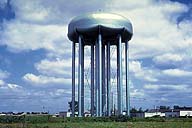
|
Image-GoddenF41
Water tower, near Urbana, Illinois. Columns are long steel tubes, fixed at the bottom and pinned at the top. The top of the tower is prevented from horizontal movement (both translation and rotation) by the X-bracing, hence the top of the column can be considered as effectively fixed in position but free to rotate.
|
|
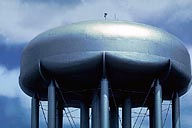
|
Image-GoddenF42
Water tower, near Urbana, Ill. Shows the connection between the top of the column and the radial beams supporting the tank. The conical taper at the top of the column indicates that there is no significant rotational fixity at that point. (Near Urbana, Illinois)
|
|
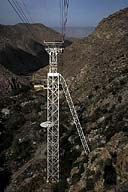
|
Image-GoddenF42.1
Tower supporting an aerial cableway, Palm Springs, California. This truss tower acts as a long vertical column supporting the weight of the longitudinal cables and cars. It is fixed at the ground, restrained at the top by, and in the direction of, the cables; and restrained against transverse displacement by the diagonal column which is pinned both to the tower and to the ground. (Palm Springs, California)
|
|
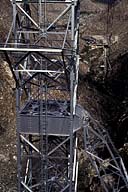
|
Image-GoddenF42.2
Tower supporting an aerial cableway, Palm Springs, California. Detail of the pinned connection in GoddenF42.1 at the top of the diagonal column. (Palm Springs, California)
|
|







